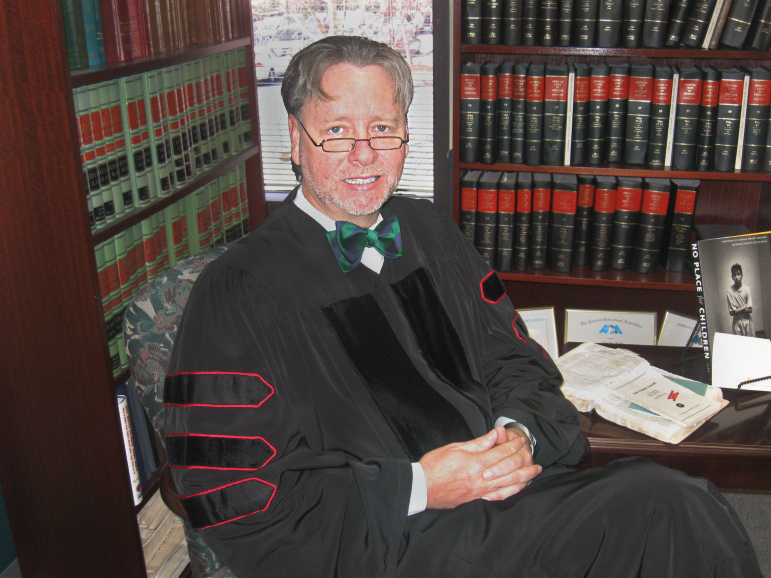 JONESBORO, Ga. -- I was leaving school, on my way to catch the bus, when I caught sight of Peter. He was pushing my sister, who had just become a victim of my enemies. They couldn’t get to me, so they went for her, an easier target.
JONESBORO, Ga. -- I was leaving school, on my way to catch the bus, when I caught sight of Peter. He was pushing my sister, who had just become a victim of my enemies. They couldn’t get to me, so they went for her, an easier target.
I was beside myself with anger. This was not the first time my sister had been attacked. I ran from behind and blindsided the boy with a sucker punch — I really had no pride when it came to protecting my sister. That punch dropped him like a rock, right into the path of an oncoming bus.
The bus came to a screeching stop, the tire inches from his head -- only a fraction of a second from manslaughter.
I shudder to think of all the instances of out-of-control teenage anger that nearly killed another, when those same angry kids never really intended to seriously hurt anyone in the first place. Kids don’t contemplate the possibilities when their anger gets the best of them.
I do recall this: My anger turned to horror at the sight of the oncoming bus before giving way to relief when the bus came to a screeching stop.
I was ecstatic in that moment that my misdemeanant act, albeit with justification by defending my sister, did not graduate to a serious felony.
In those pre-zero tolerance days, the adult educators investigated the events leading up to Peter’s near death — a little sister trembling and crying and her big brother coming to her rescue was still considered an act of chivalry blessed by our gods of education.
I was sent on my way, my arms around my sister. Peter was scolded and told he was lucky to be alive. He went home by the strong arm of his parents.
Today, I would not be so lucky. The blinding ignorance of zero tolerance that has wrapped its arms around too many of our educators has turned them from the gods of education to demons of destruction for too many students.
Don’t get me wrong — zero tolerance must exist in some cases, but very few. Just as my school superintendent says, “Our schools do not give out guns, drugs and offer gangbanging as an extracurricular activity.”
These things are brought through the front door and threaten the lives and education of every student. “All other stupid stuff,” she says, “happens by God’s creation — the neurological construction of the teenage brain.”
These things we can tolerate with appropriate consequences, and maybe a helping hand.
I am a fortunate judge to have a wise educator leading our system. Many others are not so fortunate.
The less fortunate are plagued with not-so-gifted educators struggling to navigate the dangerous waters of zero tolerance. It’s time to throw them a lifesaver, a new law that makes clear for the less gifted among us those kids who make us mad versus those who scare us.
I previously referred to this bright-line legislation as the “Bless Your Heart” Act — a double edge expression of Southern social grace served with a smile over a hint of sarcastic tone. It is a recipe served up to those my Mom would describe as lacking “horse sense.”
This bright line is grounded in the understanding of the adolescent brain and how it redefines the application of mens rea, or criminal intent, in the prosecution of juveniles when it involves typical juvenile behavior — those misdemeanant acts resulting from teenage neurological short circuitry.
Before I negotiated an agreement in 2003 with our school system and police, it was my custom to divert students arrested for school fights, disorderly conduct and disrupting school.
Most of these students were caught in the white squall of zero tolerance stirred by police and educators in their zealous attempt to create a safe school climate.
Unknown to the adults, their zealousness had an opposite effect. The net of zero tolerance grew so wide, it captured just as many, if not more, “good” students than the so-called bad ones. This caused the school climate to become ugly.
The good students soon feared going to school -- always on pins and needles praying the day would not end in the back of a patrol car. It was our version of a classic spaghetti western, The Good, The Bad and The Ugly.
The agreement of 2003 resulted in a dramatic decline of school referrals to the court, but more importantly it created a better school climate, including safer schools. Our county remains the poorest in the metro Atlanta area and so we still struggle with issues associated with struggling economies, unemployment, crime, gang activity, etc.
Despite our struggles, we are better off today with a dramatic decline in juvenile crime.
Why? Because we have positioned our school police to target the few so-called bad kids by keeping hands off the many good kids, resulting in a school climate that is not so ugly.


Pingback: The Good, The Bad and The Ugly of Zero Tolerance in Education — The Good Men Project